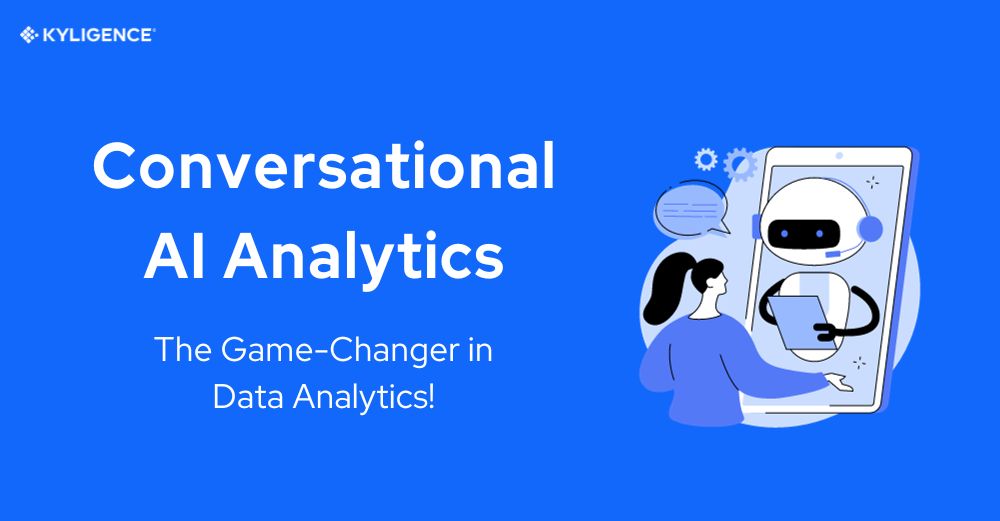Ⓒ 2023 Kyligence, Inc. All rights reserved.

Introduction
In today's data-driven world, businesses are constantly looking for innovative ways to analyze and make sense of the vast amount of information at their disposal.
One such innovation that has taken the analytics industry by storm is Conversational AI Analytics. This cutting-edge technology combines the power of artificial intelligence (AI) and natural language processing (NLP) to enable businesses to extract valuable insights from their data in a conversational manner.
What is Conversational AI Analytics?
Conversational AI Analytics refers to the use of AI-powered chatbots or virtual assistants to interact with data and provide real-time insights through natural language conversations.
These intelligent systems are designed to understand and respond to human queries, making it easier for users to access and interpret complex data without having to rely on traditional analytical tools or techniques.
Benefits of Using Conversational AI Analytics
Conversational AI analytics offers a multitude of benefits that have the potential to revolutionize the way data analysis is conducted. Here are some of them.
Improved accessibility
One of the key advantages of using conversational AI analytics is the improved accessibility it provides to data and insights.
Conversational AI analytics allows users to interact with data using natural language queries. This means that anyone, regardless of their technical expertise, can easily access and analyze data without needing to write complex code or SQL queries.
Enhanced user experience
Conversational AI analytics also enhances user experience and productivity. Instead of spending hours manually sifting through large datasets or waiting for IT teams to generate reports, users can simply ask questions in plain language and receive instant answers.
This not only saves time but also allows users to focus on higher-value tasks such as interpreting results and making informed decisions based on the insights gained from the data.
Real-time analysis
Real-time analysis is another major benefit offered by conversational AI analytics. It enables real-time analysis by providing instant responses to user queries. This means that decision-makers can access up-to-date information at any given moment, enabling them to make timely decisions based on the most current insights available.
Reduced dependency
Conversational AI analytics reduces dependency on technical expertise. Conversational AI analytics does this by allowing users to interact with data using natural language queries- making it accessible to a wider range of users.
This democratization of data analysis empowers business professionals and data analysts to independently explore and derive insights from data without relying on technical experts.
Conversational AI Analytics vs Traditional Analytics
Differences in Data Querying and Interaction
Traditional analytics often requires users to write complex queries or use predefined reports to access and analyze data. This process can be time-consuming and requires a certain level of technical expertise.
On the other hand, conversational AI analytics simplifies the querying process by allowing users to ask questions in plain English. The system then interprets these questions using NLP techniques, understands the user's intent, and retrieves relevant insights from the underlying data.
This natural language interface eliminates the need for users to learn complex query languages or rely on predefined reports, making data analysis more intuitive and user-friendly.
Advantages of Natural Language Processing
Traditional analytics methods struggle with analyzing large volumes of text-based information such as customer feedback, social media posts, or support tickets.
However, conversational AI analytics tools excel at processing unstructured text data by applying advanced NLP techniques like sentiment analysis, topic modeling, and entity recognition. This enables businesses to gain valuable insights from textual sources that were previously untapped.
Efficiency in Data Exploration and Visualization
Traditional analytics often involves navigating through multiple dashboards or reports to find specific information or answer complex business questions.
Conversational AI analytics streamlines this process by providing a conversational interface that allows users to explore data interactively through conversations with the system.
Users can easily refine their queries based on previous responses or ask follow-up questions to dive deeper into the data.
Additionally, conversational AI analytics tools often provide visualizations and charts in real-time, enabling users to gain insights quickly and make data-driven decisions more efficiently.
Scalability and Adaptability to Evolving Business Needs
Traditional analytics systems are often built with specific use cases or predefined reports in mind- making them less flexible when it comes to adapting to changing business requirements.
Conversational AI analytics, on the other hand, is designed to be highly scalable and adaptable. These tools can easily integrate with existing data sources and adapt to evolving business needs without requiring extensive customization or redevelopment.
This flexibility allows organizations to leverage their existing data infrastructure while empowering users across different departments with self-service analytics capabilities.
Conclusion
Conversational AI Analytics is revolutionizing the way we analyze data by enabling us to derive insights from conversations at scale. It made data insights accessibly and scalable.
However, to fully harness the potential of conversational AI analytics, businesses need the right tools. This is where Kyligence Zen and Kyligence Copilot come into play. These powerful platforms offer advanced capabilities for analyzing conversational data and extracting meaningful insights.
Kyligence Zen is a comprehensive metrics platform that enables users to define, collect, and analyze business metrics. It empowers users to connect data sources, define metrics, uncover insights, and share them across the organization.
On the other hand, Kyligence Copilot is an AI-powered assistant that acts as a virtual data analyst. It understands natural language queries and provides intelligent recommendations for analysis based on the context of the conversation.
With its help, users can quickly uncover patterns, trends, and anomalies in their conversational data without any coding or complex queries.
Both Kyligence Zen and Kyligence Copilot are designed to simplify the process of analyzing conversational data and make it accessible to a wider audience. With their user-friendly interfaces and powerful capabilities, they enable organizations to unlock the full potential of their conversational AI analytics initiatives.
So why wait?
Take your data analysis capabilities to new heights with Conversational AI Analytics powered by Kyligence.
